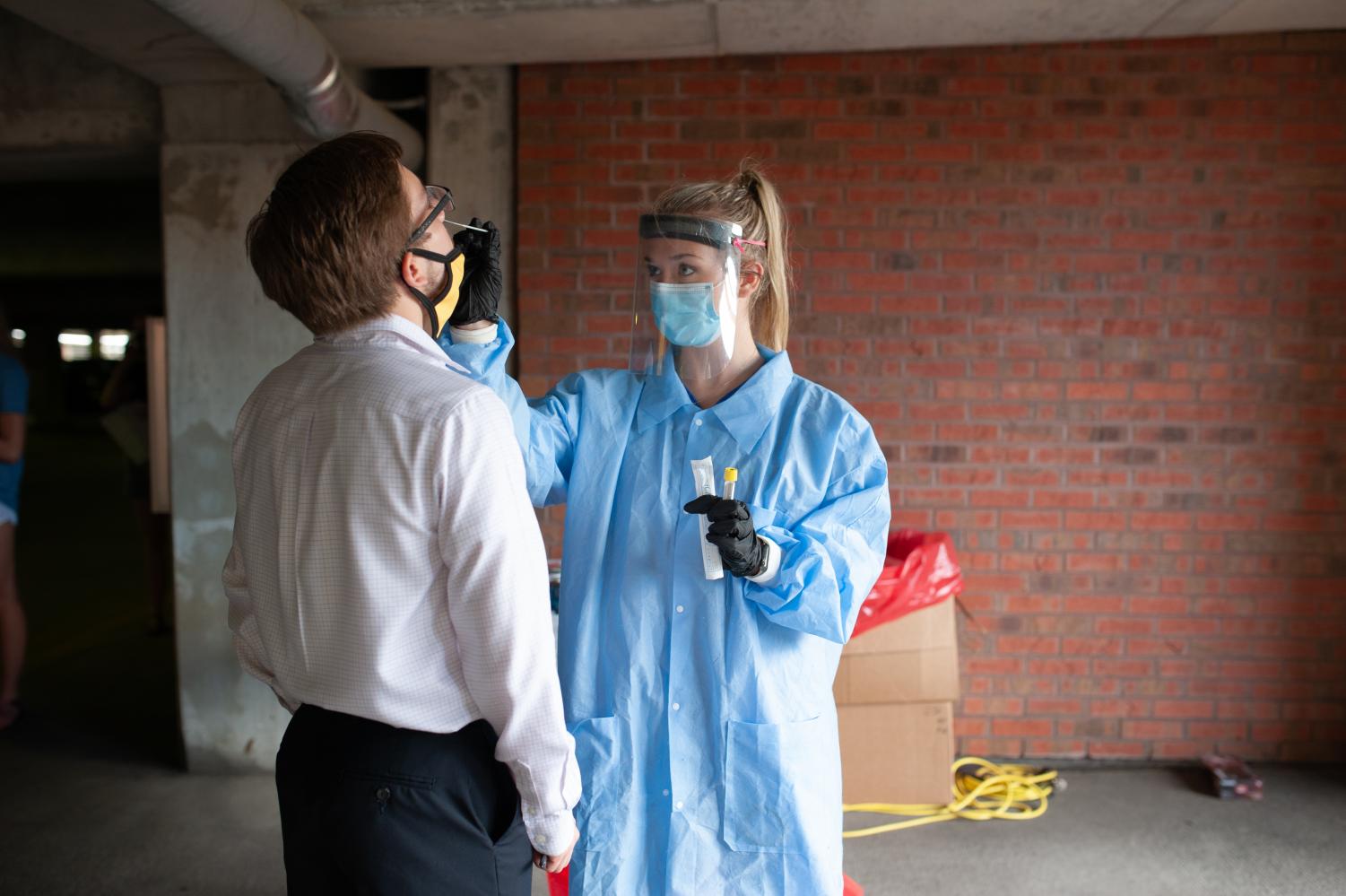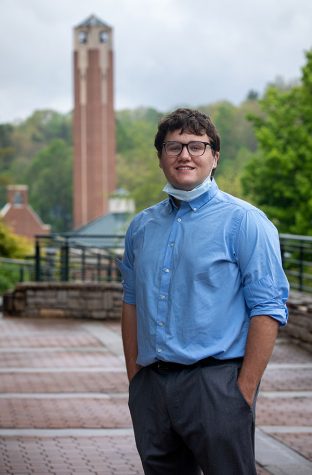As cases rise, App State among highest in testing in the UNC System
Multiple UNC System campuses have closed due to COVID-19, but App State has remained one of the largest schools to still have in person classes despite growing case numbers. Between Sept. 24 and Oct. 1, App State reported 175 new cases.
For the week ending Sept. 27, App State saw its highest positivity rate — 9% — with 1,418 tests conducted and 127 positives reported. The previous high was 3.7% for the week ending Aug. 23. App State’s total positivity rate is 4.4%.
On Oct. 1, App State announced seven new clusters associated with four dorms, two fraternities and on the volleyball. The seven clusters had nearly 50 cases. The announcement brings the total reported clusters at App State to 15.
UNC Charlotte — a school with over 30,000 students — delayed in-person classes until Oct. 1. The school opted to remain virtual for the first few weeks of the semester to slow the spread of COVID-19.
While many of the UNC System schools post data related to positive cases, only seven post data related to testing.
As of Sept. 28, App State has reported the second-most tests in the UNC System. North Carolina State University, which has nearly double the number of total cases, is the only school to have completed more tests — over 12,000.
App State has reported 675 total cases — fourth in the UNC System — since March 27 and over 7,500 tests as of Sept. 27.
But testing is not a key factor to stopping COVID-19 spread.
Claire Standley, an assistant research professor at the Center for Global Health Science and Security at Georgetown, said testing is a tool to identify where COVID-19 spread is occurring.
“Testing can be particularly useful in a college setting when applied broadly to screen for pre-symptomatic or asymptomatic infection,” Standley said. “Catching cases early makes it easier to limit transmission and keep overall case numbers down.”
App State offered a free COVID-19 testing event each week in September for faculty, staff and students.
On Sept. 25, Chancellor Sheri Everts told the App State Board of Trustees that the school would continue to host free testing events at least once a week for the foreseeable future.
“As of this week, between Student Health Service and on-campus pop-up sites, we have tested 6,151 faculty, staff and students with an average weekly positive test rate of 3.4% for a total of 207 people,” Everts said.
Everts told the board the free testing bolsters the number of tests Student Health Service staff conduct each day.
“Student Health Service staff are administering 70-80 tests a day,” said App State spokesperson Megan Hayes. “With the pop-up testing capacity, we’ve been able to administer more than 1,000 tests each week nearly every week since students moved in the week of Aug. 10.”
Hayes said each testing site has the capacity to test up to 600 people.
Completed test kits from the events are sent to Mako Medical Laboratories in Raleigh. It has over 125 laboratory staff members and can process over 25,000 test kits per day, according to its website.
Test kits have an average turnaround time of two days. Those who were tested can access their results through the Mako website.
Elizabeth Tilson, North Carolina state health director and chief medical officer, said North Carolinians need to do their part to slow the spread of COVID-19 by following the three Ws and getting tested when they’ve been exposed to the virus.

“Getting tested helps everyone – the person tested, their loved ones, and fellow North Carolinians,” she said.
The North Carolina Department of Health and Human Services released a new app called SlowCOVIDNC that will notifiy someone if they have been exposed to someone with COVID-19.
“Using this app and seeking testing when necessary are two tools that will help us slow the spread of COVID-19, but preventing infection in the first place is our best strategy,” Tilson said.
The app is available on iOS and Android devices.
Public health officials conduct contact tracing, and Hayes said App State helps communicate to students.
At the beginning of the summer and early in the fall semester, if a student tested positive, App State used Mountaineer Hall for quarantine space.
“During that time, the rooms were separated from others, and students had food delivered and were checked on frequently,” Hayes said. “As of the end of August, all quarantine space provided by the university is in off-campus locations.”
Junior Brendan Grove hadn’t gotten tested by campus before the Sept. 12 free testing event.
“I just wanted to be safe,” Grove said. “There’s no way to know whether or not I might catch it, so I just decided now was a good time to come.”
Kazoua Thao, a sophomore, has not been tested for COVID-19, but knows about the Rivers Street testing site. She says she thinks App State has done a “really good job” when it comes to testing.
The next free testing site is Oct. 3 at the Rivers Street Parking Deck from 12 p.m. to 5 p.m. The free testing events will be offered every Wednesday and Saturday during October.
“The biggest incentive (to get tested) is to protect your friends, family and community. Peace of mind is very valuable,” Hayes said. “No one wants to be responsible for getting others sick.”
We hope you appreciate this article! Before you move on, our student staff wanted to ask if you would consider supporting The Appalachian's award-winning journalism.
We receive funding from the university, which helps us to compensate our students for the work they do for The Appalachian. However, the bulk of our operational expenses — from printing and website hosting to training and entering our work into competitions — is dependent upon advertising revenue and donations. We cannot exist without the financial and educational support of our fellow departments on campus, our local and regional businesses, and donations of money and time from alumni, parents, subscribers and friends.
Our journalism is produced to serve the public interest, both on campus and within the community. From anywhere in the world, readers can access our paywall-free journalism, through our website, through our email newsletter, and through our social media channels. Our supporters help to keep us editorially independent, user-friendly, and accessible to everyone.
If you can, please consider supporting us with a financial gift from $10. We appreciate your consideration and support of student journalism at Appalachian State University. If you prefer to make a tax-deductible donation, or if you would prefer to make a recurring monthly gift, please give to The Appalachian Student News Fund through the university here: https://www.givecampus.com/campaigns/54088/donations/new?designation_id=faa93386&

Moss Brennan (he/him) is a senior journalism major with a minor in political science and media studies. He has worked on The Appalachian since freshman...

Jesse (he/him) is an Interdisciplinary Studies, Documentary Studies in Appalachia major from Sawmills, N.C. This is his third year with The Appalachian.
